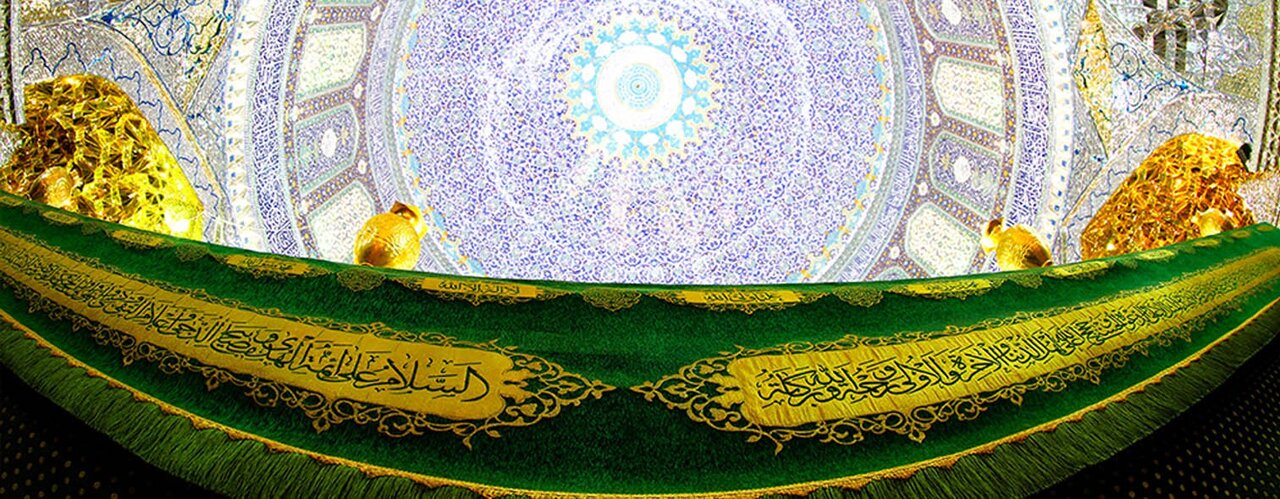Iran (IMNA) - Born in Madina on the 8th day of the month of Rabi' Thani in the year 232 A.H., Imam Hasan al-Askari's upbringing in the suburb of Samarra', specifically 'Asgar, earned him the title "al-Askari." His father, Imam 'Ali An-Naqi (AS), and his mother, Salil Khatun, were known for their piety, worship, chastity, and generosity.
Until the age of 11, Imam Hasan al-Askari lived under the care of his respected father. When his father was compelled to relocate to Samarra', the young Imam accompanied him, sharing the hardships of the journey with their family. In Samarra', he spent his time with his father, experiencing periods of imprisonment and partial freedom. Despite the challenging circumstances, he had the opportunity to benefit from his father's teachings and instructions.
Tragically, Imam Hasan al-Askari's father was martyred when the Imam was only twenty-two years old. Four months prior to his death, Imam 'Ali An-Naqi declared his son as his successor and executor of his will, urging his followers to bear witness to this fact. Consequently, the responsibilities of the Imamate were entrusted to Imam Hasan al-Askari, who courageously fulfilled them despite facing numerous difficulties and a hostile environment.
Although Imam Hasan al-Askari's life was cut short at the age of twenty-eight, it was marked by a chain of troubles and tribulations. Nonetheless, his ocean of knowledge benefited several high-ranking scholars who sought his wisdom. His unparalleled attributes included knowledge, forbearance, forgiveness, generosity, sacrifice, and piety, making him a revered figure in the Islamic community.
In the field of hadith studies, Imam al-Hasan al-Askari (AS) holds the title of "faqih," as reported by Wikishia. This designation was particularly recognized by his companions who were familiar with his expertise.

Imam al-Hasan al-Askari (AS) addressed various aspects of jurisprudence in his hadiths. While the foundation of religious organization regarding jurisprudence was established during the time of Imam al-Sadiq (AS) and further refined thereafter, Imam al-Hasan al-Askari (AS) primarily dealt with secondary matters that arose or were crucial during his era. These topics included the sighting of the new moon to determine the start of Ramadan and discussions surrounding Khums.
Despite his young age, Imam al-Askari (AS) gained immense fame due to his scholarly and moral standing, his leadership among the Shi'a community, their unwavering loyalty to him, and his undeniable respect for all individuals. Consequently, except for a few instances, the Abbasid government outwardly displayed reverence towards him as he commanded attention and admiration from the people.
Interpreting the Qur'an held great significance for Imam al-Hasan al-Askari (AS). It is attributed to him that he compiled an extensive text on Qur'anic interpretation, which stands as one of the oldest exegetical works in the Shi'a tradition. While the accuracy of this attribution may be debated, it is worth noting that the Imam's emphasis on exegetical discussions paved the way for such associations.
In the wake of uncertainties surrounding the new Imam (AS) during that period, evidence can be found in the speeches and correspondence of Imam al-Askari (AS) indicating that he believed the earth would never be deprived of God's Proof. He warned that severing the Imamate would lead to disruptions in divine affairs on earth.
Furthermore, Imam al-Askari (AS) asserted that the presence of God's Proof on earth is a divine blessing bestowed upon believers, signifying their elevated status and divine guidance.
Amidst mounting pressures faced by the Shi'a community, one recurring theme in the Imam's (AS) speeches was the call for patience, unwavering faith, and belief in eventual relief.
Additionally, his hadiths placed significant emphasis on the importance of respecting the internal relationships within the Shi'a society and fostering strong bonds with fellow believers.


Your Comment